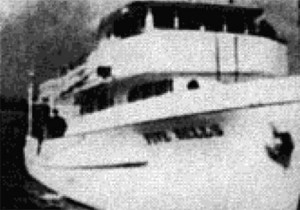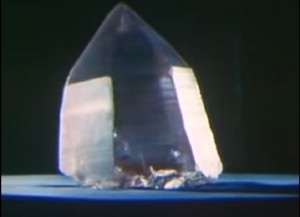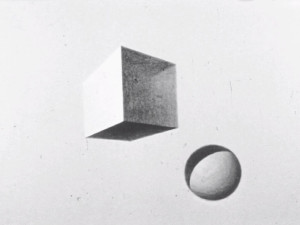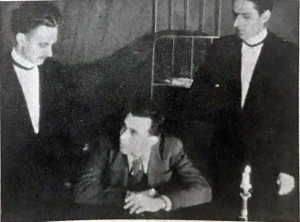
"A documentary of Dr. Fernando F. Guerrieri's cruise on "The Five Bells" from Los Angeles to Salina Cruz, Mexico with intermediate shore stops. There are scenes from some of the sleepy villages. The main interest is life aboard the yacht, cleaning, mending, fishing, eating, and all the other things and events one might expect on a yacht in southern waters. The picture creates a feeling of relaxation and restful purpose, with some deep sea fishing" PSA Journal, Nov. 1958, 46.
"1 View of small plane at an airport. 2 View of dinghy in a harbor at the Great Salt Lake. 3 Views of shoreline and boat moving through the Great Salt Lake. 4 Views of the west coast of Central America, dolphins leading the boat, fishing, Santa Cruz, local inhabitants, cliff diving and a vacation resort." University of Utah Marriott Library.
"an interesting film of a holiday afloat" (Lovell Burgess 1932: 21).

"Crystals While You Wait is a record of the triumphant climax of long scientific research for a crystal substitute. Desperately needed as a filter in expanding telephone transmission lines, the final perfection of this synthetic crystal could not have been more exciting electronically than is this study of it esthetically. To it, Joseph J. Harley has brought creative imagination, absolute accuracy and a rich sense of this drama in a laboratory. Ethylene diamine tartrate (known to electrical engineers as E.D.T.) is the hero of this scientific saga. And a colorful one it is in this record of its synthesis into electrically usable crystalline form. From its provocative lead title assembly — double exposed on a dynamic pattern of back lighted crystals — through its smoothly integrated sequences of laboratory procedures, to its triumphant and stirring climax, Crystals While You Wait is a moving marriage of science and cinematics." Movie Makers, Dec. 1948, 475.

A brief film that demonstrates how to rotated an animated cube and sphere. The film closes with the words, "La Troisieme Dimension en Cinema" (the third dimension of cinema).
"The producer must be a chef because he shows the problems of making a Baked Alaska in the best French fashion. He does a very beautiful job of it, right up to the triumphant finish." PSA Journal, Nov. 1956, 45.

From the eponymous novella by Edgar Allan Poe
"II cuore rivelatore, realizzato da Alberto Mondadori, collaboratore Mario Monicelli, scenografia di Alberto Lattuada, operatore Cesare Civita; da un racconto di Edgar Allan Poe. lnterpreti Giuseppe Pedrini, Giuliano Carta. Abbiamo accennato tempo fa ad un film sperimentale americano sullo stesso soggetto, dovuto a R. P. Cobb. Interessante appare iI confronto con questo di Mondadori; in definitiva quello appare più surrealista, questo e invece più incisivo e reale preoccupandosi piuttosto Mondadori di creare l'atmosfera allucinata con uso non eccessivo di puri espedienti tecnici; ne consegue una maggior chiarezza nel racconto cinematografico, che procede abbastanza sostenuto anche per la buona interpretazione. Il regista non ha rinunciato tuttavia a quegli espedienti tecnici, come sovrimpressioni, ma ne ha usato in modo conveniente, senza esagerazioni . E' infine da tener presente l'intendimento di tentare nel campo della produzione italiana a passo ridotto, un genere diverso da i consueti."
"II cuore rivelatore (The Tell-Tale Heart), directed by Alberto Mondadori, with the collaboration of Mario Monicelli, set design by Alberto Lattuada, cameraman Cesare Civita, based on a story by Edgar Allan Poe. Some time ago, we mentioned to an American experimental film on the same subject by R. P. Cobb. Comparing it with this of Mondadori proves interesting; ultimately, that one appears more surrealist, while this one is instead more incisive and real since Mondadori concerns himself with creating the hallucinated atmosphere through a not excessive use of pure technical expedients; a greater clarity in the cinematographic story follows, which moves forward in a sustained enough fashion also for the good acting. The director has not abandoned himself to those technical expedients, such as superimpositions, but he has used them in a suitable way, without exaggerations. It is important, finally, to keep in mind the intention to try in the field of small-guage Italian production, a different genre from the usual."
—Il Ventuno 28 (Review of the G.U.F. of Venice), May 1935
"doc. scientifico"/Scientific documentary
Total Pages: 299